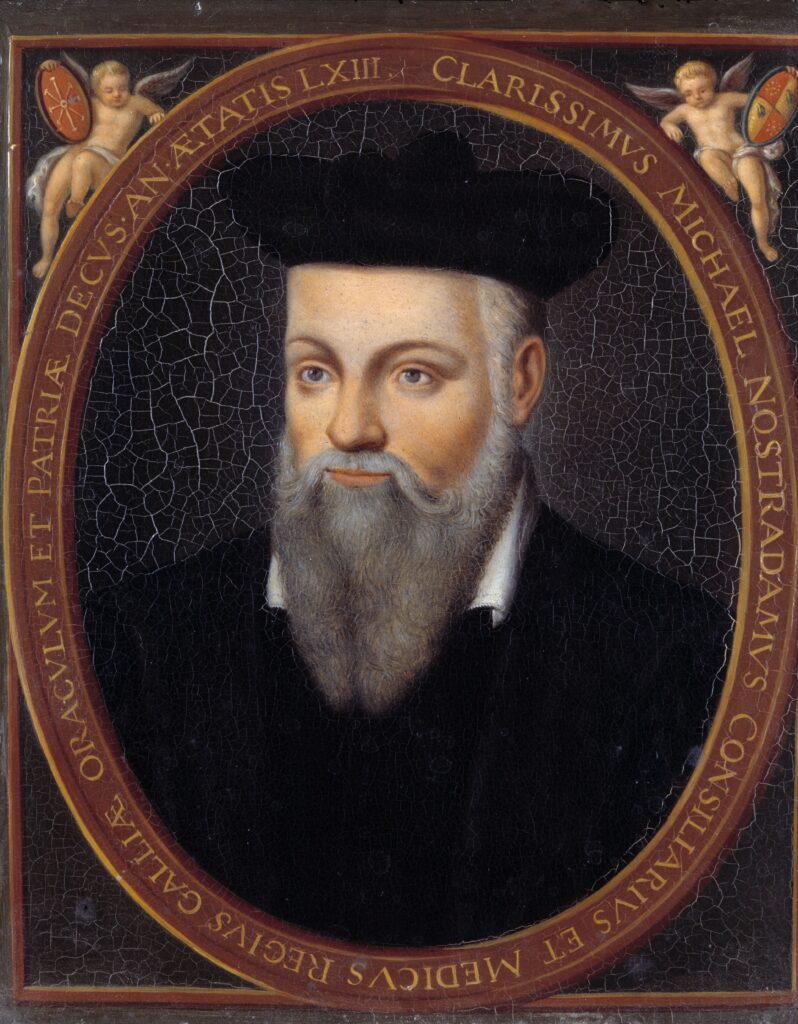Nostradamus, the 16th-century French astrologer, physician, and reputed seer, remains one of the most enigmatic figures in history. His book, Les Prophéties, published in 1555, contains a series of cryptic quatrains that have intrigued readers for centuries. These quatrains are said to predict major historical events, from the rise of Napoleon to the attacks on September 11, 2001. As the world steps into 2024, many are turning to Nostradamus’ writings to glean insights into what the future might hold.
In this article, we will delve into the supposed predictions of Nostradamus for 2024, explore how his quatrains are interpreted, and discuss their relevance in today’s context. We will also examine whether these forecasts should be taken literally or viewed as reflections of collective anxieties and aspirations.

Nostradamus: A Brief Overview
Michel de Nostredame, better known as Nostradamus, was born in 1503 in Saint-Rémy-de-Provence, France. A trained physician, he later turned to astrology and mysticism, gaining fame for his prophetic works. Les Prophéties consists of 942 quatrains written in a mixture of French, Latin, Greek, and Occitan. The cryptic nature of these verses allows for multiple interpretations, which has contributed to their enduring fascination.
Critics argue that Nostradamus’ predictions are vague and can be retrofitted to align with events after they occur. Supporters, however, view him as a visionary whose insights transcend time.
Key Predictions for 2024
1. Geopolitical Shifts
One of the most discussed quatrains linked to 2024 alludes to significant power shifts on the global stage. Scholars interpret certain verses as foretelling conflicts between superpowers or the rise of new global alliances. Given the ongoing tensions between nations such as the United States, China, and Russia, some believe Nostradamus’ writings predict escalations or resolutions in these areas.
Possible Scenarios:
- Intensified competition in technology and military dominance.
- The emergence of new regional powers challenging existing hegemonies.
- Diplomatic breakthroughs leading to peace agreements or realignments.
2. Environmental Catastrophes
Nostradamus frequently references natural disasters in his quatrains. Lines such as “The dry earth will grow more parched, and great floods will follow” have been interpreted as warnings of climate change and extreme weather events.
Implications for 2024:
- Potential acceleration of global warming effects, including rising sea levels and severe droughts.
- Natural disasters such as hurricanes, wildfires, or earthquakes causing widespread devastation.
- Increased focus on environmental policies and sustainable development.
3. Technological Breakthroughs and Risks
Another area where Nostradamus’ quatrains are speculated to align with modern developments is technology. Some interpreters suggest that he predicted advancements in artificial intelligence (AI), robotics, and space exploration.
Predicted Outcomes:
- Revolutionary discoveries that change the way humans interact with technology.
- Ethical dilemmas surrounding AI and its potential misuse.
- Space missions leading to significant milestones, such as new lunar explorations or the discovery of extraterrestrial life.
4. Social Upheaval and Revolutions
Nostradamus often wrote about societal unrest, which some believe correlates with the current rise of populism, protests, and demands for social justice. Quatrains referencing “citizens’ revolt” and “the fall of the mighty” are linked to movements advocating for equality and systemic change.
Potential Trends:
- Large-scale protests addressing economic inequality and political corruption.
- Reforms in governance to adapt to evolving societal values.
- Generational divides shaping the political landscape.
5. A Great Leader’s Rise or Fall
Several quatrains hint at the emergence or downfall of a significant leader. These verses are often cited during election years or periods of political turbulence.
Speculative Interpretations:
- The election of a transformative leader who brings hope and unity.
- The unexpected resignation or removal of a prominent figure.
- Shifts in leadership styles, prioritizing collaboration over authoritarianism.
6. Spiritual Awakening or Decline
Nostradamus also alludes to changes in humanity’s spiritual and moral compass. In an era dominated by technology, some interpret his quatrains as a call to balance material advancements with spiritual growth.
Possibilities for 2024:
- A resurgence of interest in philosophy, mindfulness, and ethical living.
- Declining influence of traditional religious institutions as people seek personalized spiritual paths.
- Increased debates on morality in the face of technological and scientific breakthroughs.
Criticism of Nostradamus’ Predictions
Despite the intrigue surrounding Nostradamus, skepticism abounds. Critics argue that his quatrains are too ambiguous to serve as reliable forecasts. The language he used was intentionally obscure, allowing for a wide range of interpretations.
Additionally, many so-called “predictions” attributed to Nostradamus are either misinterpretations or fabrications. Some verses are taken out of context, while others are entirely invented to fit modern narratives.
The Role of Nostradamus in Modern Culture
Nostradamus’ legacy endures not because of the accuracy of his predictions but due to humanity’s innate curiosity about the future. His writings often resurface during times of crisis, reflecting our collective desire for guidance and reassurance. In popular culture, Nostradamus is frequently referenced in movies, books, and media, cementing his status as a cultural icon.
Conclusion
Nostradamus’ quatrains continue to captivate the imagination, offering a mirror to humanity’s hopes and fears. While it is tempting to attribute specific events to his predictions, it is essential to approach his writings with a critical mind. Nostradamus’ work reminds us that the future is not set in stone but shaped by our actions and choices.
As we navigate 2024, the true value of Nostradamus lies not in his alleged foresight but in the opportunity to reflect on our priorities, challenges, and aspirations. His quatrains may serve as inspiration to strive for a better future, rooted in wisdom and resilience.
FAQs
1. Who was Nostradamus?
Nostradamus was a 16th-century French astrologer, physician, and seer best known for his book Les Prophéties, which contains cryptic verses believed to predict future events.
2. Did Nostradamus predict events for 2024?
Nostradamus did not provide specific dates for his predictions. However, interpreters attempt to link his quatrains to current events, including those expected in 2024.
3. Are Nostradamus’ predictions accurate?
The accuracy of Nostradamus’ predictions is highly debated. Critics argue that his writings are too vague to be reliable, while supporters see them as visionary.
4. What are some major predictions for 2024?
Key interpretations of Nostradamus’ quatrains for 2024 include geopolitical shifts, environmental challenges, technological breakthroughs, social upheaval, changes in leadership, and spiritual transformations.
5. Should Nostradamus’ predictions be taken seriously?
While Nostradamus’ predictions can be fascinating, they should be viewed critically. They often reflect broader human concerns rather than specific foresight.
6. Why do Nostradamus’ predictions remain popular?
Nostradamus’ enduring popularity stems from his enigmatic style, the universal appeal of prophecy, and humanity’s fascination with the unknown.
7. How can we interpret Nostradamus’ writings?
Interpreting Nostradamus requires understanding the historical and cultural context of his time. Modern interpretations often reflect contemporary issues and fears.
8. What lessons can we learn from Nostradamus?
Rather than focusing on literal predictions, Nostradamus’ work encourages introspection, adaptability, and the pursuit of a thoughtful, balanced future.











